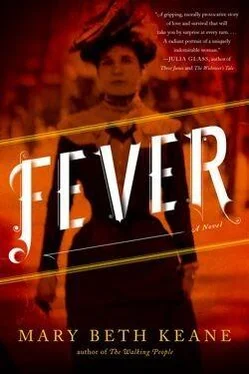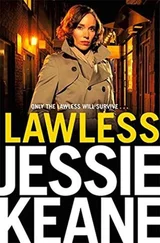“A few months after the accident a man came with a document to sign, and that was it. Salvatore signed it and explained to me that there was nothing else they could do. They never found him in the river. He never washed up anyplace. Salvatore was as sad as I was, but it’s different for men. He went to work and came home and seemed the same but I knew better. We had three boys, and then we had two.”
A memory of Tobias Kirkenbauer ambled across Mary’s mind: she saw herself tying him into his pram, pushing him down to the water with a picnic of bread and cheese. What did they say to each other? What was that funny way he said her name? She recalled the tiny hairs on the doctor’s top lip when he warned her not to tell Mrs. Kirkenbauer that the boy was gone. If Mrs. Kirkenbauer had asked for him, Mary would have lied, and yet she died anyway. Though Mary had seen enough death to know what it looked like when it came, it was always a shock to see that whatever it is that animates a person can slip away so easily, like a drop of water slipped down a drain. Perhaps she found out, Mary considered. Perhaps a mother knows.
“I’m not telling you this for you to say sorry, Mary. Any decent person is sad to hear such a thing so it’s useless to say anything in response. I’m telling you this so you can see I know a little about men and about life. A woman who is married twice and has three children and gets herself to America with an infant alongside knows a little about the world and about men. You understand? You can imagine what it was like on that ship without a husband and with a boy to suckle.”
Mary waited for what she knew was coming.
“You should stay away from that Alfred.”
Mary felt the old defensiveness rise up but swallowed it back down again. “Well, anyway, he’s married.”
Mila Borriello touched Mary’s hand. “How many hours was I with him since he found Mr. Driscoll and came up here to knock on my door? In all those hours, not once does he mention his wife. The only woman he mentioned was you.”
Mary felt ashamed at the soaring she felt in her chest upon hearing this, at the familiar lightness in her bones that used to come over her when she’d hear his key in the door. Now that he’d seen her, he’d make excuses to come back, and she had to decide what she’d do when that happened. Liza Meaney will never know him like I do, she thought. Then she remembered that Liza Meaney had cured him, had convinced him to stick with a job, and for Liza Meaney he’d proposed marriage, become a stepfather. She had a vision of herself on North Brother, looking across the water at Manhattan, thinking about what he could possibly be doing that would keep him from writing to her, from trying to see her. No, she decided. No.
On the night Driscoll was taken by ambulance, Alfred slept in the old man’s rooms. He heeded Mary’s advice and washed himself in the basin. Not wanting to sleep on the bed Driscoll had been coughing into, he found a spare blanket and made a bed on the kitchen floor. In the morning, he walked to the stable with his thoughts full of Mary, and how he could put everything right again.
As he cleaned the stalls and fed the horses, he decided he’d wait until after Samuel’s exams to tell Liza what he now knew — that he could not be with her, and certainly could not marry her. He’d wait until after Christmas. After the New Year. But when he got back to their rooms that afternoon and saw them there, mother at the sink and son at the table, and the way she warned him with a look to keep quiet, and winced when he took off his boots by the door, and followed him around, touching everything he touched to straighten it, right it, clean from it whatever invisible grime he might have carried there on his fingertips, he knew he would not be able to stay there one day longer. He returned to his boots and went out the door before she could ask where he was going.
Back on the sidewalk he headed straight into the barrage of sound — children shrieked, their mothers calling after them; the horses clopped, whinnying and snouting at anything that came near them; the carriages squeaked and rattled; the automobiles honked and sputtered as they tore down the streets, the passengers gripping the crossbars.
Alfred sank into the bright busyness of the Lower East Side. He noticed now that many of the windows had Christmas candles waiting until nightfall to be lit, and remembered that Christmas was just ten days away. The day was warm, more like October than December, and he walked in a westerly direction across Allen and Eldridge Streets, through the blocks of all Italian — Mulberry and Mott. He headed south along Lafayette, and then west again until he came to the outdoor market on Chambers, where a twelve-foot Yule tree was standing at the northwest corner, decorated with beads and tinsel. He bought a loaf of bread and a few slices of smoked trout wrapped in a newspaper. With the bread and fish tucked under his arm, he turned east again. After a few blocks, he stopped on a curb and ate his meal while a group of children kicked a ball around him. Licking his fingers, he continued toward the East River, passing the faces of a hundred tenements standing shoulder to shoulder, like a row of tight-lipped and straight-backed soldiers. The zigzagging fire escapes, chipped and rusted, marred each façade, and Alfred knew without looking that the interior hallways were similarly spoiled, the plasters cracked and crumbling, the pastoral scenes painted over and over again until every color was a shade of gray. On one block alone he passed a delicatessen, a butcher, a baker, a milliner, a tailor, and a factory that made women’s shoes. He passed a police officer who was trying to coax a dog from the street, and another officer yelling up to a man who had thrown a pile of chicken bones from his fifth-floor window. The man shouted back to the officer in German, and then pulled the curtain across. “Want me to tell you what he said?” Alfred asked the officer.
“Don’t bother,” the officer replied, and continued on.
Alfred turned and turned and turned again until before him was the Brooklyn Bridge, that shining, massive jewel suspended over the water and held there, it seemed from Alfred’s vantage, by magic, by a simple crosshatch of wire and string. He was a German, the man who thought how to do that. Alfred marveled as he stared at how the bridge seemed to take a flying leap across the tidal strait below. He recognized the gothic towers of the old world, except instead of appearing bulky and grim like they did in the Rhine country, here in America they held only promise, and the arched portals carved into them seemed to Alfred to welcome those who crossed like a collection of solemn ancestors, holding the new Americans in the palms of their hands.
He walked across the bridge and then jumped the trolley on the Brooklyn side, held tight to the bar, and after a long time hopped off at Coney Island, where, passing the Loop-the-Loop and packs of young girls pressed into circles, talking behind their hands and laughing, he remembered bringing Mary there when Aunt Kate was still alive and watching her as she danced with other girls. Even then it was a rare thing to see her so joyous, and even more rare as time went on, but it was worth the wait and even severe Mary, even worried Mary, even Mary with a cook’s slouch was worth a hundred Liza Meaneys.
• • •
It was nearly midnight when Alfred got back to Liza’s rooms, and after climbing the narrow stairs he listened at the door for a minute to discover whether she was still awake, waiting for him, or if the boy was still studying at the table. He thought about what he’d say, whether he’d hold her or if that was wrong, whether he’d tell the boy himself or let her do it. He heard nothing, and there was no light under the door.
Читать дальше












